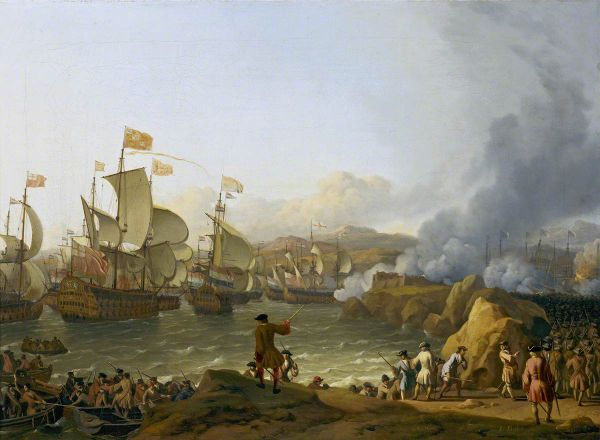Annotation:Welcome from Vigo: Difference between revisions
(Created page with "=='''Back to [[{{BASEPAGENAME}}]]'''== ---- <p><font face="garamond, serif" size="4"> '''WELCOME FROM VIGO.''' Scottish, Air (6/8 time). G Major. Standard tuning (fiddle). AAB...") |
m (Text replacement - "garamond, serif" to "sans-serif") |
||
| (5 intermediate revisions by one other user not shown) | |||
| Line 1: | Line 1: | ||
=='''Back to [[{{BASEPAGENAME}}]]'''== | =='''Back to [[{{BASEPAGENAME}}]]'''== | ||
---- | ---- | ||
<p><font face=" | <p><font face="sans-serif" size="4"> | ||
'''WELCOME FROM VIGO.''' Scottish, Air (6/8 time). G Major. Standard tuning (fiddle). AABB. The song was written by Thomas D'Urfey and was printed in his '''Wit and Mirth; or, Pills to Purge Melancholy''' (1719), where it is titled "A | '''WELCOME FROM VIGO.''' Scottish, Air (6/8 time). G Major. Standard tuning (fiddle). AABB. The song was written by Thomas D'Urfey and was printed in his '''Wit and Mirth; or, Pills to Purge Melancholy''' (1719), where it is titled "A Scotch Song, Sung by Mr. Leveridge," referencing the famous stage singer and performer of the early 18th century. Allan Ramsay also published the song in '''The Tea-Table Miscellany''' (1723–37, Song 28). The lyric celebrated the Anglo-Dutch capture of the Spanish silver fleet in Vigo Bay in September, 1702, although the campaign failed in its primary goal of taking the port city of Cadiz. Queen Anne declared a public thanksgiving in November, which became the occasion of patriotic songs and poetry. The "Welcome from Vigo" title comes from the first line of the third and last stanza, which goes:[[File:vigo2.jpg|600px|thumb|right|The Battle of Vigo Bay, 12 October 1702 | ||
< | Ludolf Backhuysen I (1630–1708)]] | ||
<blockquote> | |||
''Then welcome from Vigo,''<br> | ''Then welcome from Vigo,''<br> | ||
''And Cudgeling Don Diego,''<br> | ''And Cudgeling Don Diego,''<br> | ||
| Line 23: | Line 24: | ||
<br> | <br> | ||
</font></p> | </font></p> | ||
<p><font face=" | <p><font face="sans-serif" size="4"> | ||
''Source for notated version'': | ''Source for notated version'': | ||
<br> | <br> | ||
<br> | <br> | ||
</font></p> | </font></p> | ||
<p><font face=" | <p><font face="sans-serif" size="4"> | ||
''Printed sources'': Oswald ('''Caledonian Pocket Companion, Book V'''), 1760; p. 8. | ''Printed sources'': Oswald ('''Caledonian Pocket Companion, Book V'''), 1760; p. 8. | ||
<br> | <br> | ||
<br> | <br> | ||
</font></p> | </font></p> | ||
<p><font face=" | <p><font face="sans-serif" size="4"> | ||
''Recorded sources'': <font color=teal></font> | ''Recorded sources'': <font color=teal></font> | ||
</font></p> | </font></p> | ||
Latest revision as of 14:44, 6 May 2019
Back to Welcome from Vigo
WELCOME FROM VIGO. Scottish, Air (6/8 time). G Major. Standard tuning (fiddle). AABB. The song was written by Thomas D'Urfey and was printed in his Wit and Mirth; or, Pills to Purge Melancholy (1719), where it is titled "A Scotch Song, Sung by Mr. Leveridge," referencing the famous stage singer and performer of the early 18th century. Allan Ramsay also published the song in The Tea-Table Miscellany (1723–37, Song 28). The lyric celebrated the Anglo-Dutch capture of the Spanish silver fleet in Vigo Bay in September, 1702, although the campaign failed in its primary goal of taking the port city of Cadiz. Queen Anne declared a public thanksgiving in November, which became the occasion of patriotic songs and poetry. The "Welcome from Vigo" title comes from the first line of the third and last stanza, which goes:

Then welcome from Vigo,
And Cudgeling Don Diego,
With bouger Rascallion,
And Plund'ring the Galleoons;
Each brisk Valiant fellow,
Fought at Rondondellow,
And those who did meet,
With the Newfound-Land Fleet;
Then for late Successes,
Which Europe Confesses,
At Land by our galliant Commanders;
The Dutch in strong Beer,
Shou'd be Drunk for one Year,
With their General's Health, in Flanders.
"Welcome from Vigo" was the indicated tune for a song in Robert Drury's The Mad Captain (1733, Air 28).
Source for notated version:
Printed sources: Oswald (Caledonian Pocket Companion, Book V), 1760; p. 8.
Recorded sources:
